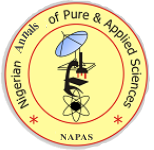Assessment of Maternal Cryptosporidium Infection and Risk Factors among Antenatal Attendees in Makurdi, Benue State, Nigeria
Maternal Cryptosporidium infection in Makurdi, Benue State Nigeria
DOI:
Keywords:
Cryptosporidium, Pregnant women, Diarrhoea, Makurdi, Risk factorsAbstract
In order to determine prevalence, and risk factors and ascertain the association of diarrhoea symptoms of maternal Cryptosporidium infection in Makurdi, 510 faecal samples were randomly collected from volunteered consented antenatal attendees in Makurdi Township. The stool samples were concentrated using the formol-ether oocyst concentration technique, stained with modified Ziehl Nelson cold stain and oocysts were identified by microscopy. Human Immunodeficiency Virus (HIV) serological status was determined using Determine (Inverness, Japan) and confirmed with Uni-Gold HIV1/2 (Trinity Biotech, USA). Chi-square (χ2) in an SPSS (version 20.0) software was used to compare categorical variables and significant association was determined at a 95% level of probability. Cryptosporidium oocyst was identified in 98(19.2%) of the faecal samples examined. HIV-positive attendees were significantly more infected with Cryptosporidium (84.4% vs 9.9%, P<0.001) than their HIV-negative counterparts. We found a strong association between stool consistencies (P < 0.001), duration of diarrhoea (P < 0.001), possession of domestic animals (P < 0.001) and Cryptosporidium infection rate. There was also a significant difference (P < 0.001) between the rate of infection and sources of drinking water. However, the infection could not be associated with age (P=0.121), type of toilet system in use (P=0.793) and literacy (P=0.665). Pregnant women in this study suffer a high burden of Cryptosporidium infection which could complicate the HIV status of those immunocompromised culminating in diarrhoea-related mortality. Routinely all antenatal attendees with diarrhoea should be tested for Cryptosporidium in this setting.
Downloads
Published
How to Cite
Issue
Section
License
Copyright (c) 2022 Emmanuel Msugh Mbaawuaga, Sunday Aondorumun Iornienge, Yuana Awua, Winifred Iveren Nyinoh, Samuel Kuma Hembah-Hilekaan

This work is licensed under a Creative Commons Attribution-ShareAlike 4.0 International License.



 Contact Us
Contact Us Editorial Team
Editorial Team Join As A Reviewer
Join As A Reviewer  Request For Print Copy
Request For Print Copy


 Cprint Publishers
Cprint Publishers